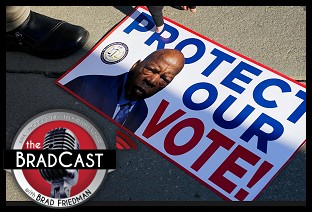 I'd strongly recommend that you read this piece by Jeff Spross, entitled "The Debt Everyone is Freaking Out About Does Not Exist", in full. It's a very smart and sober primer explaining...well, exactly what the headline says.
I'd strongly recommend that you read this piece by Jeff Spross, entitled "The Debt Everyone is Freaking Out About Does Not Exist", in full. It's a very smart and sober primer explaining...well, exactly what the headline says.
Yes, Washington D.C. and the corporate media which cover it, are spending a whole lot of time and resources playing into what amounts to a massive presentation of kabuki theater, and its not one that actually helps us with the addition of new jobs or economic growth in any real way whatsoever. Arguably, as Spross explains, it may well accomplish just the opposite.
It's difficult to select just the key passages from the piece, as mentioned, since it's chock full of smart analysis throughout. But, for those without the patience to read the whole thing, here are a few of the central thoughts that you should educate yourself about...
So the debt that’s got everyone worried is the part we haven’t yet incurred. And that debt, by definition, does not exist. It’s not a certainty, it’s merely a projection by the Congressional Budget Office. And trying to model how the federal budget, not to mention the entire American economy, will behave years or even decades in the future is a devilishly treacherous business.
For instance: one of Rep. Paul Ryan’s (R-WI) favorite talking points in 2011 was that the computer simulations CBO uses to model the economy crash when they attempt to account for the debt load in 2037. Imagine trying to model the 2011 economy in 1985. Things you’d never see coming include (among other things) the Internet, fracking, massive advances in computing power, the renewable energy boom, three wars, a massive recession, and Harry Potter. And predictions can be hard even over shorter time frames. In 1995, CBO predicted the deficit in 2000 would be well over $200 billion. We ran a surplus of $236 billion.
In fact, Ryan plastered dramatic graphs of debt going out 75 years onto everything in sight while stumping for his last budget. Forget predicting 2011 in 1985. That’s like predicting 2011 in 1940.
So neither the impending Baby Boomer retirement nor growing health care costs make astronomical debt a certainty, despite the insistence of the conservative and centrist punditariat. With respect to the Boomers, economist Dean Baker ran the numbers and found that if productivity growth in the economy clocks in at one percent until 2035 (a very conservative estimate) the resulting gains will swamp the added retiree burden.
Spross goes on to explain how even the freak out about rising health care costs, and the threat it is said to pose to Medicare and Medicaid should not be taken for granted either, since it's based on curves that change, for different reasons, over time. It has already begun to change, he notes, as health care costs have "unexpectedly slowed to a 50-year low since 2009," about which he adds (and explains why): "We probably have Obamacare to thank for that."
He argues that we are, essentially, "fixating on a problem that may or may not exist," and by doing so, "Policymaking becomes less about solving concrete problems ... and more about made-up numbers on an Excel spreadsheet."
Both in Europe and here in America, we have tax codes that by their nature bring in less revenue when the economy goes into a downturn, and a series of safety net programs designed to ramp up when unemployment rises. The vast majority of the deficits we’ve seen since President Obama took office were due to the 2008 collapse. Under depression conditions, deficits are a feature, not a bug.
But these excerpts, even as extended as they are, don't do the full story justice. As I said, do yourself a favor and go read the whole thing.
By way of just one more piece of added perspective on this issue. Here is the public debt-to-GDP ratio for a whole bunch of developed countries, and for the world as an average. As you can see, in 2010, the U.S. was below most of the other developed nations on this score, and just a touch higher than the average of world countries...

If you followed the news of late out of Washington, however, you'd think we're on the brink of complete debtpocalypse! That's a pretty clear victory for D.C. Republicans, and, as usual, a clear failure of both Democrats and the U.S. corporate media.


 Sunday 'Close Enough' Toons
Sunday 'Close Enough' Toons A Pretty Weak 'Strongman': 'BradCast' 10/30/25
A Pretty Weak 'Strongman': 'BradCast' 10/30/25 'Green News Report' 10/30/25
'Green News Report' 10/30/25
 Proposal for 'First Politically Viable Wealth Tax' Takes Shape in CA: 'BradCast' 10/29/25
Proposal for 'First Politically Viable Wealth Tax' Takes Shape in CA: 'BradCast' 10/29/25 Monster Storm, Endless Wars, Gamed Elections:
Monster Storm, Endless Wars, Gamed Elections: 'Green News Report' 10/28/25
'Green News Report' 10/28/25 Let's Play 'Who Wants
Let's Play 'Who Wants Sunday 'Cartoonists Dilemma' Toons
Sunday 'Cartoonists Dilemma' Toons Exiled NOAA Scientists Resurrect Critical Disaster Database: 'BradCast' 10/23/25
Exiled NOAA Scientists Resurrect Critical Disaster Database: 'BradCast' 10/23/25  'Green News Report' 10/23/25
'Green News Report' 10/23/25 Trump-Allied GOP Partisan Buys Dominion Voting Systems: 'BradCast' 10/22/25
Trump-Allied GOP Partisan Buys Dominion Voting Systems: 'BradCast' 10/22/25 Trump, Republican Law(lessness) & (Dis)Order: 'BradCast' 10/21/25
Trump, Republican Law(lessness) & (Dis)Order: 'BradCast' 10/21/25 'Green News Report' 10/21/25
'Green News Report' 10/21/25 Celebrating 'No Kings': 'BradCast' 10/20/25
Celebrating 'No Kings': 'BradCast' 10/20/25 Sunday 'How It Started' Toons
Sunday 'How It Started' Toons SCOTUS Repubs Appear Ready to Gut Rest of Voting Rights Act: 'BradCast' 10/16/25
SCOTUS Repubs Appear Ready to Gut Rest of Voting Rights Act: 'BradCast' 10/16/25 'Green News Report' 10/16/25
'Green News Report' 10/16/25 The 'Epstein Shutdown' and Other Autocratic Nightmares: 'BradCast' 10/15/25
The 'Epstein Shutdown' and Other Autocratic Nightmares: 'BradCast' 10/15/25 Group Vows to Block MO's GOP U.S. House Gerrymander: 'BradCast' 10/14/25
Group Vows to Block MO's GOP U.S. House Gerrymander: 'BradCast' 10/14/25 Trump Labor Dept. Warns Trump Policies Sparking Food Crisis: 'BradCast' 10/9/25
Trump Labor Dept. Warns Trump Policies Sparking Food Crisis: 'BradCast' 10/9/25 Trump's Losing Battles: 'BradCast' 10/8/25
Trump's Losing Battles: 'BradCast' 10/8/25 Trump, Roberts and His Stacked, Packed and Captured SCOTUS: 'BradCast' 10/7/25
Trump, Roberts and His Stacked, Packed and Captured SCOTUS: 'BradCast' 10/7/25 Trump Attempting His 'Invasion from Within': 'BradCast' 10/6/25
Trump Attempting His 'Invasion from Within': 'BradCast' 10/6/25 Biden Budget Expert: Mass Firings in Shutdown 'Illegal': 'BradCast' 10/2/25
Biden Budget Expert: Mass Firings in Shutdown 'Illegal': 'BradCast' 10/2/25 Why is DOJ Suing 'Blue' States for Their Voter Databases?: 'BradCast' 10/1/25
Why is DOJ Suing 'Blue' States for Their Voter Databases?: 'BradCast' 10/1/25
 VA GOP VOTER REG FRAUDSTER OFF HOOK
VA GOP VOTER REG FRAUDSTER OFF HOOK Criminal GOP Voter Registration Fraud Probe Expanding in VA
Criminal GOP Voter Registration Fraud Probe Expanding in VA DOJ PROBE SOUGHT AFTER VA ARREST
DOJ PROBE SOUGHT AFTER VA ARREST Arrest in VA: GOP Voter Reg Scandal Widens
Arrest in VA: GOP Voter Reg Scandal Widens ALL TOGETHER: ROVE, SPROUL, KOCHS, RNC
ALL TOGETHER: ROVE, SPROUL, KOCHS, RNC LATimes: RNC's 'Fired' Sproul Working for Repubs in 'as Many as 30 States'
LATimes: RNC's 'Fired' Sproul Working for Repubs in 'as Many as 30 States' 'Fired' Sproul Group 'Cloned', Still Working for Republicans in At Least 10 States
'Fired' Sproul Group 'Cloned', Still Working for Republicans in At Least 10 States FINALLY: FOX ON GOP REG FRAUD SCANDAL
FINALLY: FOX ON GOP REG FRAUD SCANDAL COLORADO FOLLOWS FLORIDA WITH GOP CRIMINAL INVESTIGATION
COLORADO FOLLOWS FLORIDA WITH GOP CRIMINAL INVESTIGATION CRIMINAL PROBE LAUNCHED INTO GOP VOTER REGISTRATION FRAUD SCANDAL IN FL
CRIMINAL PROBE LAUNCHED INTO GOP VOTER REGISTRATION FRAUD SCANDAL IN FL Brad Breaks PA Photo ID & GOP Registration Fraud Scandal News on Hartmann TV
Brad Breaks PA Photo ID & GOP Registration Fraud Scandal News on Hartmann TV  CAUGHT ON TAPE: COORDINATED NATIONWIDE GOP VOTER REG SCAM
CAUGHT ON TAPE: COORDINATED NATIONWIDE GOP VOTER REG SCAM CRIMINAL ELECTION FRAUD COMPLAINT FILED AGAINST GOP 'FRAUD' FIRM
CRIMINAL ELECTION FRAUD COMPLAINT FILED AGAINST GOP 'FRAUD' FIRM RICK SCOTT GETS ROLLED IN GOP REGISTRATION FRAUD SCANDAL
RICK SCOTT GETS ROLLED IN GOP REGISTRATION FRAUD SCANDAL VIDEO: Brad Breaks GOP Reg Fraud Scandal on Hartmann TV
VIDEO: Brad Breaks GOP Reg Fraud Scandal on Hartmann TV RNC FIRES NATIONAL VOTER REGISTRATION FIRM FOR FRAUD
RNC FIRES NATIONAL VOTER REGISTRATION FIRM FOR FRAUD EXCLUSIVE: Intvw w/ FL Official Who First Discovered GOP Reg Fraud
EXCLUSIVE: Intvw w/ FL Official Who First Discovered GOP Reg Fraud GOP REGISTRATION FRAUD FOUND IN FL
GOP REGISTRATION FRAUD FOUND IN FL

































